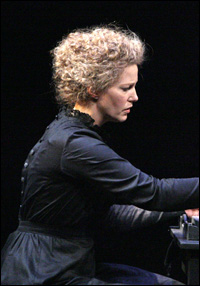
*
"Marie Curie is my hero," Alan Alda says. "Few people have accomplished something so rare — changing science. And as hard as that is, she had to do it against the tide of the culture at the time — the prejudice against her as a foreigner, because she was born in Poland and worked in France. And the prejudice against her as a woman."
Alda is talking about his first fully produced play: the drama Radiance: The Passion of Marie Curie, at Geffen Playhouse in Los Angeles. The Tony-winning director is Daniel Sullivan (Proof). Anna Gunn of TV's "Breaking Bad" plays the title role.
Alda, 75, is still most widely known for playing Hawkeye Pierce on TV's "M*A*S*H" from 1972 to 1983. He has acted, written and directed in TV and film, winning six Emmys and getting an acting Oscar nomination for "The Aviator"; onstage he is a three-time Tony nominee: for The Apple Tree (1967), Jake's Women (1992) and Glengarry Glen Ross (2005).
He is also a science enthusiast. He's on the board of the World Science Festival, and he was host of "Scientific American Frontiers" on television for 11 years. Marie Curie is a towering figure in science history, renowned for her work in radioactivity — a word she created. She discovered the elements radium and polonium. She twice won the Nobel Prize — in physics in 1903, with her husband, Pierre Curie (and Henri Becquerel), and in chemistry in 1911, on her own. She was the first woman to win a Nobel, and the first person of either sex to win two.
The play takes place mostly in the period between the two prizes. Pierre was killed in a vehicular accident in Paris in 1906, and in 1910 she became involved in an affair with a married scientist that became a public scandal. "Between the two awards is the story of the growth of a woman and her ability to direct her own destiny. The first prize was awarded to her and Pierre together, but at first the Nobel committee wanted to give it to Pierre and completely ignore her work, because she was a woman. He appealed and they gave it to both of them. He was allowed to get up and receive the award. She had to sit in the audience and watch."
 |
||
| Anna Gunn in Radiance. |
||
| photo by Michael Lamont |
He loves science because "scientists do amazing things. I'm first of all an artist, and I love a great human story. Science is people like Marie sacrificing so much to be able to understand a mystery — the dedication, the gift, to discover something that has never been seen before. It's a beautiful story, and it's always one that's exciting and inspiring."











